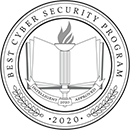
B.S. in Cybersecurity
Advance Your Career Through a Cyber Security Degree
Looking for a degree that combines your talent for technology with a desire to serve and protect? Regent’s Bachelor of Science in Cybersecurity program will prepare you to begin or advance your technology and network security career in government, military, private, public and nonprofit sectors. Learn how to create and execute a digital security strategy that supports and defends data resources managed by your employer.
ALIGN YOURSELF WITH EXCELLENCE
Regent was named as a National Center of Academic Excellence in Cyber Defense Education (CAE-CDE) for the B.S. in Cybersecurity by the National Security Agency (NSA) and the Department of Homeland Security (DHS). It is among only four percent of universities in the nation to receive this merit, according to the data published by NICE (National Initiative for Cybersecurity Education, 2018).
PROTECT AGAINST THREATS
Discover how homeland security is integrating a strong cyber workforce to protect the nation’s networks.
PURSUE YOUR MILITARY ASPIRATIONS
Regent offers a great location for students who want an on-campus experience and seek to apply their cybersecurity degree in the service of the nation. Virginia Beach, Virginia is located just 15 minutes from Norfolk’s Naval Base; further, there are several military installations in the area including: Naval Station Oceana, Fort Story, Dam Neck Fleet Training Center and more. The B.S. in Cybersecurity program is also offered online, so you can earn your degree from nearly anywhere.
BUILD ON A STRONG FOUNDATION
Anchor your knowledge and skill on Christian principles and values.
LEARN FROM THE BEST IN REGENT’S CYBERSECURITY DEGREE PROGRAM
Be mentored by faculty in Virginia Beach who hold the highest degrees in their field.

|

|

|

|
On completing this cybersecurity undergraduate degree, you will be able to:
- Analyze cybersecurity threats, trends and strategies.
- Identify cybersecurity principles, methods and tools that aid in the defense of cyberattacks.
- Decrease system vulnerabilities through integrated security technologies.
Read about the Regent University student who secured an internship at Google.
Career Opportunities
- Computer Systems Analyst
- Networks & Systems Engineer
- Information Security Analyst
- Digital Forensics Specialist
- Cyber Risk Manager
- Network Applications Supervisor
- Intelligence Investigator
Issues relating to Computer Information Systems and the ethical and moral responsibilities of those who work with computers, professionals or end users. Provides foundation to make appropriate decisions when facing difficult situations.
Computer systems, networks, databases, intellectual property, computer security, artificial intelligence, legal and ethical considerations, codes of conduct, privacy, computer crimes, and the future of computing and the Internet and their relationship to the business world.
Introduces programming fundamentals using Visual Basic.net. Use of algorithms and computer logic to translate data into information through structured design, coding, testing, and program debugging, writing programs in high-level, object-oriented language.
Recovery of evidence from any media or digital device that can store or transmit data. Best practices and current techniques for capturing and analyzing digital evidence to support a criminal or civil complaint in court.
Introduction to relational database management systems through the study of the tools and techniques of database analysis and design. Attention to data modeling, designing relational databases, normalization, and relationships, using modern database applications to create tables, queries, forms and reports. Prerequisite: ISYS 214.
Students gain in-depth knowledge of networking and telecommunications fundamentals including LANs, MANs, WANs, intranets, the Internet, and the WWW. Attention to data communication and telecommunication concepts, models, standards, and protocols in the context of installation, configuration, systems integration, and management of infrastructure technologies. Prerequisite: ISYS 204 and Sophomore standing.
Business and government are facing a rapidly expanding need for information assurance professionals. Information protection program design, internetworking and application security, the development of information security safeguards and information security auditing, disaster recovery, policy development, identity management, and effective threat assessment. Prerequisite: ISYS 204 and Sophomore standing.
Securing the systems that run our computers is the key to ensuring that our essential information remains safe and available. This course provides the essentials for understanding the threats to systems security, the methods to counter these threats, and some practical work in systems security. A computer system with appropriate software is required. Prerequisite: ISYS 331.
Access to the Internet for multiple purposes is one of the major components of most business operations. Many businesses also have intranets, which provide internal communications. Security of these assets is critical for a successful business. Course provides an introduction to the concepts and procedures of assessing and providing security for internet/intranets. Prerequisite: ISYS 331.
Investigation of the techniques of system analysis and design, with attention to the concepts, skills, methodologies, and tools essential for systems analysts to develop information systems successfully. Prerequisite or co-requisite: ISYS 317.
Information security must be a significant part of any business plan today, and managers in this field must remain aware of the principles and methodology of managing information security. Provides an in-depth view of the management of information security for government, corporations, and other institutions. Prerequisite: ISYS 331.
Global and local networks provide capabilities that have become essential in the success of the world economy for businesses and individuals. Defending these systems against attacks through the use of worms, viruses, and other criminal acts is imperative. Provides a solid foundation in the fundamentals of network security and some hands-on experience in the installation and utilization of firewalls and intrusion detection systems. Prerequisite: ISYS 331.
The threats to information security are numerous, and even the best security systems can be penetrated in one manner or another. In addition, physical security is a consideration for securing the systems necessary for business operations to continue. Natural disasters, terrorist activities, and internal subversion can all cause destruction or denial of service. Provides a framework for understanding the threats and how to counter them. Prerequisite: ISYS 331.
Capstone course in which advanced IST students, operating as a high-performance team, engage in and complete the design and implementation of a significant information system. Project management, management of the IS function, and systems integration are components of the project experience. Prerequisite or co-requisite: Senior status and ISYS 406.
Introductory study of basic descriptive and inferential statistics with an emphasis on real world applications and the use of current technology. Topics include sampling, random variables, probability distributions, measures of central tendency and variation, and testing of hypotheses. Cannot be applied to the mathematics major.
Admission requirements vary based on the stage you’re at in life. Select a link below to learn how to apply.
2019-20 Tuition Rates
| Program Type | Tuition |
|---|---|
|
On-Campus Student
|
|
|
Online Student (enrolled in 8-week classes)
*Average number of credits per semester. |
|
|
RN to B.S. in Nursing Tuition |
|
Student Fees
|
Fee |
Amount |
Description |
|
Application Fee (On-Campus & Evening/Online Students)
|
$50 |
One-time fee, nonrefundable |
|
Enrollment Deposit (On-Campus Students) Enrollment Deposit (Evening/Online Students) |
$150 $50 |
Fee is deducted from tuition costs |
|
Graduation Fee(On-Campus & Evening/Online Students) |
$60 |
One-time fee upon submission of graduation application |
|
University Services Fee(On-Campus Students) University Services Fee(Online Students) |
$700/semester $550/semester |
Contributes to university academic and administrative operations |
Optional Fees
|
Late Payment |
$100/Session |
Incurred per session in the event of late tuition payment |
|
Course Fees |
Varies, |
Some courses in theater, animation, cinema television or science labs carry an additional fee |
2020-21 Tuition Rates
| Program Type | Tuition |
|---|---|
|
On-Campus Student
|
|
|
Online Student (enrolled in 8-week classes)
*Average number of credits per semester. |
|
|
RN to B.S. in Nursing Tuition |
|
Student Fees
|
Fee |
Amount |
Description |
|
Application Fee (On-Campus & Evening/Online Students)
|
$50 |
One-time fee, nonrefundable |
|
Enrollment Deposit (On-Campus Students) Enrollment Deposit (Evening/Online Students) |
$150 $50 |
Fee is deducted from tuition costs |
|
Graduation Fee(On-Campus & Evening/Online Students) |
$60 |
One-time fee upon submission of graduation application |
|
University Services Fee(On-Campus Students) University Services Fee(Online Students) |
$750/semester $600/semester |
Contributes to university academic and administrative operations |
Optional Fees
|
Late Payment |
$100/Session |
Incurred per session in the event of late tuition payment |
|
Course Fees |
Varies, |
Some courses in theater, animation, cinema television or science labs carry an additional fee |
- A.S. in Criminal Justice
- B.A. in Leadership Studies – Government & Public Policy
- B.S. in Computer Engineering
- B.S. in Computer Science
- B.S. in Cyber & Digital Forensics
- B.S. in Information Systems Technology – Information Security
- B.S. in Management Information Systems
- B.S. in Paralegal Studies
- B.S. in Professional Studies
- Certificate of Undergraduate Studies in CISCO Networking
- Doctor of Strategic Leadership (DSL)
- M.A. in Law – Cybersecurity Law
- MBA – Cybersecurity Management
- M.S. in Cybersecurity
- M.S. in Health Information Systems Administration
- Ph.D. in Organizational Leadership

